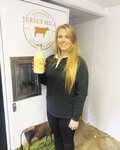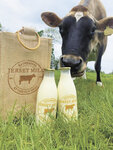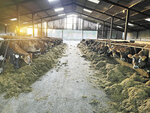


CARLISLE, England — From the stress of the lockdowns that were in place during the coronavirus pandemic in 2020 was born an idea that has enabled one English dairy farm to flourish.
Katherine Jenkinson, along with her parents, Andrew and Rebecca, and brother, Tom, operate Fordsyke Farm in Carlisle, a town in northern England just 10 minutes from the Scottish border.
Fordsyke Farm is home to 160 head of both pedigreed and crossbred cows. Included in that group is Katherine’s herd of 30 purebred Jerseys. Cows are milked in a swing-12 herringbone parlor and average 40 pounds of milk per day with tests of 6.1% butterfat and 4.04% protein. The farm consists of 206 acres of grassland.
“We have a low input, low output system,” Jenkinson said. “The cows have a grass-based diet from April through October, depending on weather. Throughout the winter, the cows get silage, wholecrop barley and an 18% protein parlor cake.”
The idea for on-farm milk sales first came to Jenkinson in March 2019.
“I was working as a tutor and assessor at Newton Rigg College in Penrith,” Jenkinson said. “One of the first things we did with the students was look at farm diversifications. One of the student’s family had put in a vending machine on their farm, and I started thinking maybe I could do this at home.”
A year later, Jenkinson returned home and found herself struggling as the first lockdown commenced.
“I was feeling down about everything,” she said. “We were in lockdown. Mum had the coronavirus, so I could not go to work, so I wasn’t earning any money. But that vending machine idea had been in the back of my mind. It just felt like the time was right to do it.”
Jenkinson said she quickly realized that financing the idea would be difficult on her own. She developed a business plan, applied for a loan from a small business lender and was awarded the money to move forward.
The necessary machines — one for dispensing glass bottles and one for dispensing milk — were ordered in August, and by November, Jenkinson was selling pasteurized, non-homogenized Jersey milk from her on-farm vending machine.
In addition to selling fluid milk, Jenkinson operates an on-farm store that features four flavors of milkshakes and a rotation of 30 flavors of ice cream as well as soap made from milk produced on the farm. Jenkinson outsources the processing of the ice cream.
In the early days, the vending machines were successful, but Jenkinson has noticed a slowdown since the lifting of restrictions. Jenkinson said that in the last year, they have sold an average of 50 liters per day during the summer months, with the highest days selling as many as 100 liters. Milk produced by Katherines Jerseys is A2A2, making it a popular choice for people with lactose intolerance.
“The vending machines were a way for people to get out of the house and socialize while staying within the guidelines of the lockdown,” Jenkinson said. “However, now that things have resumed as normal, we have noticed a decrease in demand for people supporting small and local businesses.”
Jenkinson said she is considering how to mobilize her milk sales, taking a vending machine to shows, fairs and parks, giving more people the opportunity to discover fresh Jersey milk.
The weather has presented a challenge with sales this winter, Jenkinson said, with gale-like winds and freezing temperatures.
The northern part of England is known for being wet and cold but has been unpredictable recently, Jenkinson said.
“The weather is one of our main challenges,” she said. “Once it starts raining, it sometimes forgets how to stop. Last year, we had a wet spring and just wanted some sunshine. Then, we had eight weeks of no rain, and the silage grass burnt off.”
The area around Carlisle is heavily populated with dairy farms, roughly 150 ranging from herds as small as 60 cows to as large as 1,200 cows. The management styles of the neighboring farms are diverse, Jenkinson said, ranging from highly intensive models to those practicing New Zealand-style grazing.
“On our farm, we are wanting to improve our soil management each year, so we can get the most out of our grass, getting the best output from our cows,” Jenkinson said. “This includes soil sampling and reseeding fields as needed.”
Jenkinson said her family continues to look for ways to improve the herd to better meet their goals.
“We are wanting to increase the number of crossbreds for more milk production, and we are using Holstein bulls to breed those cows,” Jenkinson said. “We want to keep all of the Jerseys pedigreed, using the best genetics we can.”
In breeding Jerseys, Jenkinson said she utilizes the World Wide Sires mating program to select bulls that have plenty of milk and components behind them, while ensuring she is using bulls that sire strong, deep cows with good feet and legs.
The hardiness of the breed is a benefit for the farm’s grazing program, Jenkinson said.
“I love working with cows that have very little foot problems,” Jenkinson said. “Our cows walk a half milk to a field during the summer, and we know we don’t have to worry about their feet.”
Much of the Jersey herd traces to Jenkinson’s original cow, Farlam Adas Gloria, and her 11 daughters. There are now 40 head in the herd that include Gloria in their lineage.
“My favorite cow is Katherines Elizabeth Excitation,” Jenkinson said. “She is a very special cow and the cow in my logo. She was the firstborn from Gloria and has given me a heifer every year, bar one when she had twins — a bull and heifer. She was born in 2007 and is happily retired, living her summers in a paddock with some show heifers. Her offspring make up my show team every year.”
Elizabeth’s daughter, Katherines Jenny Ontime, was a perennial show winner for Jenkinson.
“Jenny really put the Katherines prefix on the map,” Jenkinson said. “Her daughter, Katherines Matt Amelia, and her granddaughter, Katherines Spanner Man Sophia, have started living up to her legacy, and I am excited to see what 2024 brings.”
Jenkinson’s love of the Jersey cow goes back as long as she can remember.
“My life has been all about Jersey cows,” she said. “There are photos of me as a little girl, feeding cows with Dad in the field. If I’m having a bad day, I can walk into the cow shed and will be surrounded by cows instantly, making me feel much better.”
Comments
No comments on this item Please log in to comment by clicking here